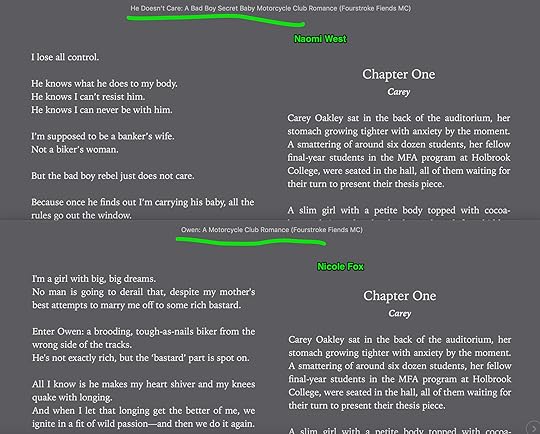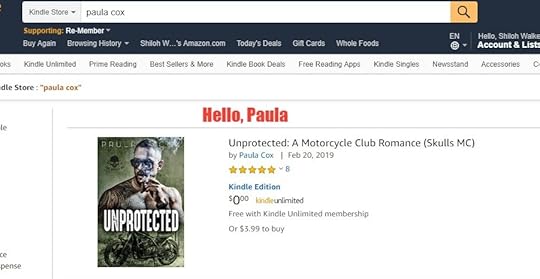Hot Takes: Part…who knows? So you want to know how to spot the scammers.
The past few week has been a hot mess in a falling apart handbasket. I do have other words for it, but if I get too free with them, I’ll run off track and I’m doing a hell of a lot of that lately. People paying attention to the #CopyPasteCris mess have probably noticed there’s been a lot of talk about things not necessarily related to plagiarism. Cris Serruya did, after all, plagiarize some major authors, including Nora Roberts.
One question that seems to be prevalent in a lot of minds is how this all happened and how it got so big all of a sudden.
A Reckoning A Long Time In the Making
Well, it didn’t happen all of a sudden. This crap has been going on in the indie world for a while.
If you hang out on social media sites much, you probably heard about #Cockygate. The long story short there, a woman wanders into the writing field, writes some books, decides to do a series with Cocky in it, then suddenly notices other people use the word Cocky–and some of those uses predated hers–but wah, they’re damaging her brand, so she tries to trademark a word. It didn’t go well.
But during the mess, something a relatively small group of authors & readers knew about became something of a focal point. Not just about Faleena Hopkins, but other authors.
Bookstuffing
Author puts up a book up for 0.99 or whatever, and only part of the book is new content. The rest is backlist books, excerpts and other assorted bullshit. This sums up bookstuffing, but I have an infograph, thanks to twitter user, Anteria Hawbaker.

Now, you might thinking… what’s the problem here? More to read, right? Well, it depends on your point of view. Those stuffing the books were (and still are) pushing the authors who don’t stuff books farther and farther out of the way on Amazon. If writers don’t make money, they can’t really afford to write. Not to mention if a handful of authors are dominating an area, that’s not leaving much room for you to find a lot of variety. Of course, you’ll always have your big name favorites, but this does make it harder for you to find newer people to love, because it’s harder for newer people to make it in a field that’s getting increasingly narrower.
Additionally, a lot of bookstuffers don’t care as much about craft and use scammy tactics like clickfarms and the kindle flip… please… they even name this shit now.
The comment during the chat.
Chance: “ohhh ehhm what do- uh, I don’t know what that means” pic.twitter.com/lzBP0Ooy8Z
— Nikki (@ease_dropper) June 3, 2018
There’s a lot of this under tags like #getloud and #bookstuffing on twitter. Which has led to some heated discussions going on in social media. A small group of readers has been ringing the bell about scammers & bookstuffing for months and not many have been pay been attention. During this time, the scamming has gotten more and more blatant and now we have a book Frankensteiner with her very own hashtag… #copypasteCris
And So It Comes to This
Inside the indie world, a lot of authors knew there was scamming going on. Not all, of course, but there were signs and plenty have talked.
There’s still a disconnect of sorts between indies and traditionally published authors, though, and from my perspective, there’s an ‘old guard’ of indies and a newer group. The old guard, many of them, started out in traditional publishing, still hang with a lot of traditionally pub authors and I don’t know if there’s as much conversation between the two groups. I could be wrong. I could be missing out entirely. I lost a sibling just under two years ago and I’m just slowly coming out of a depression, so I’m not quite as in touch with some things as I used to be.
However, I still get the vibe that there’s what is almost a ‘generational’ disconnect between indies and traditionally pub authors and the old guard traditionally pub fit in more with the trad, pubbed authors. This disconnect reminds me a lot of the disconnect that once existed between print authors and ebook authors…ah, the good old days.
This disconnect also leads to not as much sharing of info and even when people follow each other and are friendly, the things that affect one group (like indies) may not necessarily grab the attention of the other group (frex, traditionally pubbed authors).
This could be apathy, it could be one group not seeing how it affects them or a lack of understanding, it could be a complete lack of awareness this was even going on–keep in mind, there are some authors who aren’t on social media all that much, and when it comes to more established authors or reclusive authors, some aren’t on social media at all. It could be any number of reasonings and I think it’s probably a mix of all across the general group, because that’s reflective of human nature in general.
And now we have this big rumbling, a shocking surprise about all the scamming going on in the Kindle platform and how it’s affecting authors across a lot of platforms.
Indie authors have seen it, or at least a lot of them have, and they’ve been talking about it for months. Serruya’s actions brought it all into the public eye and now a lot of authors are realizing this is all very, very bad for the industry, but for many, it seems like this just sprung up out of nowhere.
Not the case.
Some screenshots from one of the readers who’ve been ringing that scammer bell… Nikki / aka Ease_dropper on twitter.
When I say “KU scammers” I mean the SCAMMERS. If you aren’t a scammer, I don’t mean you. Scamming example: 2-3 guys run a few LLCs & have a dozen or so pen names. They use Sopris Page Press, MBK Hanson, Inc, badboyromancegroup, & probably others. I’m on some of their email lists pic.twitter.com/01zhCrPENm
— Nikki (@ease_dropper) February 24, 2019
These are new release newsletters from ‘authors’ that frequently show up on Amazon’s KU bestseller list. Keeping in mind that Amazon rewards these people with bonuses for selling the most copies, etc, there’s money to be made in selling the most books. They don’t have to be good books. they just have to sell.
They don’t even have to be original…and I do mean original. As in published by one author, under one name, one time only.
See below.
These all came from Nikki’s feed, in the thread from the tweet above, but I’m using the images themselves so people can see the full size images. You can click on it to open a new tab to see names better, and look at the quick release schedule. That’s important.



About that original content








And food for thought on how this happens–there are suggestions that these ‘authors’ sell manuscripts once they aren’t bringing in money. Somebody else repackages, recovers, slaps a new cover on. Sound insane?
Well… keep reading.
One of the big bookstuffers who was finally removed from Kindle Unlimited last summer was Cassandra Dee. Look below. See the covers?
Looks like Cassandra Dee can’t make up her mind which pen name to use. @DavidGaughran @ease_dropper @BSommerland @ivyquinnauthor @romancewriters let’s make sure Amazon is aware of ALL these #bookstuffing pen names #GETLOUD pic.twitter.com/s9qldyTzFl
— Caitlyn Lynch aka Catherine Bilson (@caitlynlynch6) June 11, 2018
But to test this…an experiment!
I took a name at random from the newsletter image and went to Amazon.



And low and behold…

This book has been published before. Under another name and has since been pulled from circulation, but with the internet, nothing really disappears.
A lot of these authors are practically ghosts. No really internet presence. They popped up out of nowhere and there’s no socialization anywhere. That alone doesn’t mean much, because authors aren’t always the most social creatures. But there’s also no website. Just about every smart author knows a website is crucial. It’s where your fans go to look for you. There might be a facebook page or a twitter, but they’re almost robotic…little real interaction with authors, no real talk about writing craft, or even just how you want to drag your character through the screen and choke him for being a butthead.
Save for the books? They don’t seem to exist. And many of these books look like they’ve been published, pulled then regurgitated with new titles and covers.
So… want to know how to figure out if an author might be a scammer?
Look at the author. Do they have a website? Even new authors tend to have those. New authors also tend to be active on Facebook & Twitter, etc because it’s something agents and editors look for. If you see a new to author and it’s somebody you’ve never heard of and you can’t be sure if they are legit? Check those things out.
Look at their social media. Even if you’re not on twitter, you can skim a look at their feed. No, not all authors talk a lot, and not all authors are on social media, but if the author you’re interested in has a solid social media profile and has like… oh, …couch, cough, 210k tweets… random number, totally, that’s not how many tweets I have… or even five hundred tweets and they follow a mix of people, etc? They’ve got a website? It’s less likely you’re dealing with a scammer.
These scammers profit because they invest so little in the current persona, then dump it and reinvent a new identity at the drop of a hat. You can’t do that when it comes to social media and rebuilding websites, etc gets pricey, it’s time consuming and leaves more of a digital trail.
So… there are a few ways to vet an author…looking at the website, checking for social media…and if it’s an ebook? Read the sample. Really, those pages above? That stuff ain’t nothing to write home about. Free & 0.99 cents ain’t a bargain if you’re getting crap work anyway.
Also, if you want to do something about it, you can become a BOOK DETECTIVE…this is more helpful if you’re on social media, because the more people involved, the better. Kindle users can easily download samples from books by authors in the newsletter shots posted above. Look for phrases that are descriptive, that stand out. Copy the text and do a google search for those words.
If you find a match, let people know and people can go to the book’s page on Amazon and report it. There’s a ‘report’ section down near the bottom and you can report books for violations of terms of service. I’d just report the book. You can click on report inappropriate content, then select violates KDP terms of service. DO NOT REPORT AS COPYRIGHT INFRINGEMENT. Only the authors of the books can do that. But repackaged material like this very well is pushing KDP’s quality standards. I’d point out that the book had been published before, post a link to where you found it and ask how that’s holding up the KDP standards for quality work. If enough complaints are made against a book/author, Amazon may take action.
You can also tweet about it. Send them messages on Facebook. Email. Amazon has altered TOS when it’s clear scammers are abusing the system, but it takes work part of the people to get it done and that means…well, work.
**FYI!!!! It seems like some people are getting grumbly over a lot of things in various places and missing some important points.
SCAMMING HURTS LEGIT AUTHORS!!!
I want it clear that most people are aware most KU AUTHORS are NOT scammers. Yes, some readers are leery now, and with good reason, thus the reason for the post.
We don’t need to have that argument here. What we need to do is focus on educating AND raising awareness (and hell with Amazon) so we can fix the problem and reclaim the genre some scammers are trying to steal from us.
If you’re coming in here to defend something sleazy like reselling manuscripts to repackage it…well, LOL. Don’t. Do it on your own blog, because it will last here about as long as it takes me to see it.
Also! If you’re new here… this isn’t about legit ghostwriting. I ghostwrite on the side and legit ghostwriters aren’t part of this problem.
Thank you for coming to my TED talk.
The post Hot Takes: Part…who knows? So you want to know how to spot the scammers. appeared first on Shiloh Walker.



